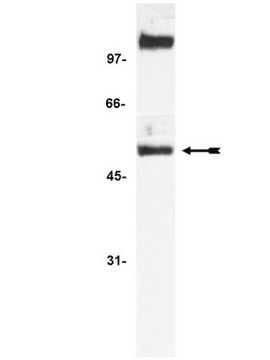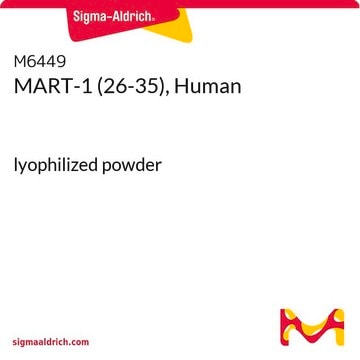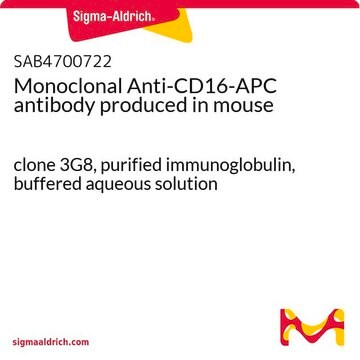SRP3321
MIF human
recombinant, expressed in insect cells, ≥98% (SDS-PAGE), ≥98% (HPLC)
Sinonimo/i:
GIF, GLIF, MMIF
Autenticatiper visualizzare i prezzi riservati alla tua organizzazione & contrattuali
About This Item
Codice UNSPSC:
12352200
NACRES:
NA.32
Prodotti consigliati
Origine biologica
human
Ricombinante
expressed in insect cells
Saggio
≥98% (HPLC)
≥98% (SDS-PAGE)
Forma fisica
lyophilized
PM
15.0 kDa
Confezionamento
pkg of 25 μg
Impurezze
endotoxin, tested
N° accesso UniProt
Condizioni di spedizione
wet ice
Temperatura di conservazione
−20°C
Informazioni sul gene
human ... MIF(4282)
Descrizione generale
Macrophage migration inhibitory factor (MIF) is a small secreted protein that can act as a pleiotropic pro-inflammatory cytokine as well as an enzyme. MIF pro-inflammatory activity can be initiated by signaling through cluster of differentiation 74 and 44 (CD74 and CD44), resulting in the secretion of tumor necrosis-α (TNF-α), interleukins-1, -6, -8, and various matrix metalloproteinases (MMPs). The gene encoding this protein is localized on human chromosome 22q11.23. Insect cell derived recombinant MIF is a 15kDa protein containing 124 amino acid residues, including an N-terminal His-tag.
Azioni biochim/fisiol
The enzymatic activity of macrophage migration inhibitory factor (MIF) is characterized by its ability to act as a tautomerase, capable of catalyzing the keto to enol isomerization of keto-phenylpyruvate and L-dopachrome. It appears as though MIF catalytic activity is dependent upon a trimeric configuration and a free N-terminal proline residue.
Stato fisico
Lyophilized from 10mM Sodium Phosphate, pH 7.0.
Ricostituzione
Centrifuge the vial prior to opening. Reconstitute in water to a concentration of 0.1-1.0 mg/ml. Do not vortex. This solution can be stored at 2-8°C for up to 1 week. For extended storage, it is recommended to further dilute in a buffer containing a carrier protein (example 0.1% BSA) and store in working aliquots at -20°C to -80°C.
Codice della classe di stoccaggio
11 - Combustible Solids
Classe di pericolosità dell'acqua (WGK)
WGK 3
Punto d’infiammabilità (°F)
Not applicable
Punto d’infiammabilità (°C)
Not applicable
Certificati d'analisi (COA)
Cerca il Certificati d'analisi (COA) digitando il numero di lotto/batch corrispondente. I numeri di lotto o di batch sono stampati sull'etichetta dei prodotti dopo la parola ‘Lotto’ o ‘Batch’.
Possiedi già questo prodotto?
I documenti relativi ai prodotti acquistati recentemente sono disponibili nell’Archivio dei documenti.
Dual role of macrophage migration inhibitory factor (MIF) in human breast cancer.
Verjans E
BMC Cancer, 9, 230-230 (2009)
Inhibition of MIF bioactivity by rational design of pharmacological inhibitors of MIF tautomerase activity.
Dios A
Journal of Medicinal Chemistry, 45(12), 2410-2416 (2002)
Crystal J DiCosmo-Ponticello et al.
Cytokine, 69(1), 47-55 (2014-07-16)
Macrophage migration inhibitory factor (MIF) is a pro-inflammatory cytokine that was initially identified by its ability to inhibit the movement of macrophages. Cell migration is a highly complex process involving changes to the cytoskeleton and cell adhesion molecules, and is
Simona Cardaropoli et al.
Journal of interferon & cytokine research : the official journal of the International Society for Interferon and Cytokine Research, 34(7), 537-542 (2014-03-13)
Macrophage migration inhibitory factor (MIF) plays a pivotal role in pregnancy-related proinflammatory processes, such as placentation and labor. Differential MIF concentrations have been correlated with pathological events during pregnancy, such as recurrent miscarriages and severe pre-eclampsia (PE). The aim of
Defining minimum genomic regions of imbalance involved in testicular germ cell tumors of adolescents and adults through genome wide microarray analysis of cDNA clones.
McIntyre A
Oncogene, 23(56), 9142-9147 (2004)
Il team dei nostri ricercatori vanta grande esperienza in tutte le aree della ricerca quali Life Science, scienza dei materiali, sintesi chimica, cromatografia, discipline analitiche, ecc..
Contatta l'Assistenza Tecnica.








